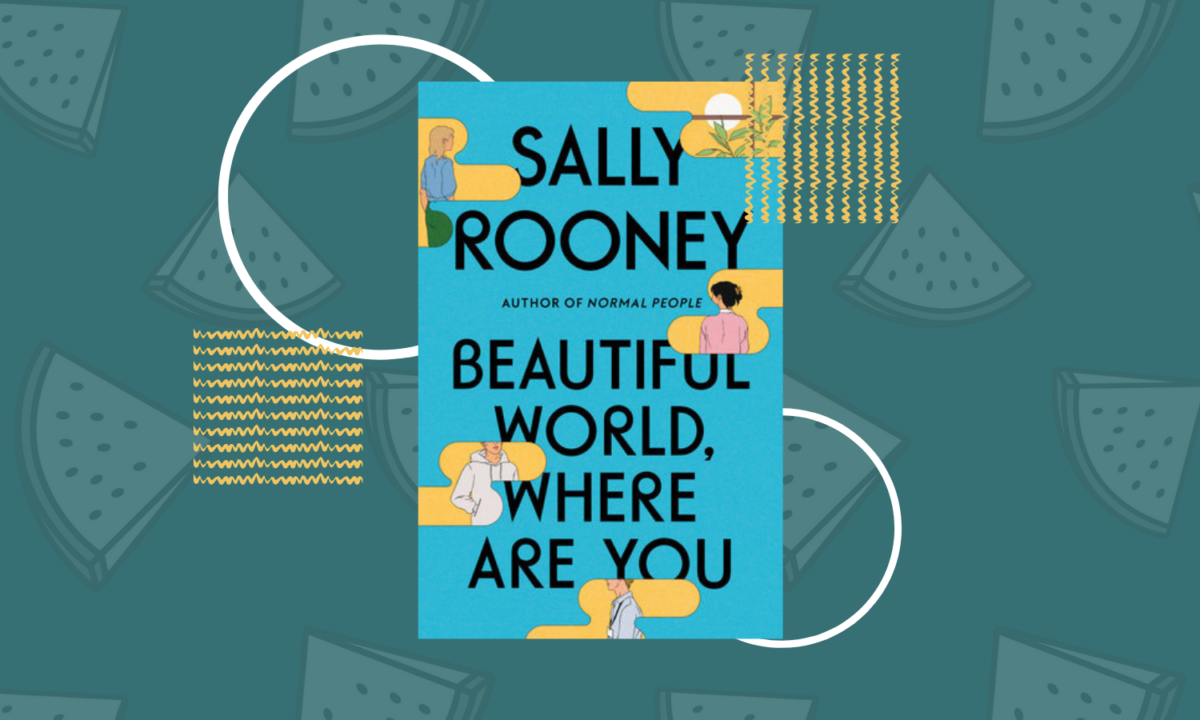Author’s most recent work explores climate change, break-ups, and even allows characters to be happy – sort of

Sally Rooney is not your typical in-vogue author. Her subjects — ordinary people living their ordinary lives, mostly —are hardly ground-breaking. She doesn’t write series, or genre fiction, or include much in the way of plot, either. Instead, Rooney found success in writing character-driven, emotionally-dizzying stories, all following the theme of millennial anguish.
Almost all of her characters are depressed, if not worse. They are unsure in love, bored by life, politically demoralized and usually broke. In a brighter world, Rooney’s dismal interpretation of life would not pass the test of relatability, and her books dismissed by the average reader. But in our world of staggering housing prices, a static job market and an anxiety-inducing pandemic, her pessimistic tone has proven itself to be exactly what readers want.
At first glance, Beautiful World, Where Are You — Rooney’s third novel, released Sept. 7 of this year — appears to continue in this niche. Alice is a writer, unhappy, uninspired and escaping her notoriety in the countryside. Her best friend Eileen, meanwhile, lives in the city, broken-hearted and financially unstable. The book consists partially of their emails, long, essay-like correspondence, rich with philosophizing on — as the title suggests— the current state of the world. “[I]t seems vulgar, decadent, even epistemically violent, to invest energy in the trivialities of sex and friendship when human civilisation is facing collapse.” Eileen writes. “But at the same time, that is what I do every day.”
Both sex and friendship play large roles in the novel. For Eileen and Alice respectively, Rooney has written a man counterpart. While Eileen pines after childhood friend Simon, Alice connects with Felix on Tinder. In typical Sally Rooney style, the characters are preoccupied with sex and sexuality, caught between love and lust, grappling with the dangerous game that is modern hook-up culture. Even Eileen and Alice’s so-called ‘best’ friendship, when scrutinized under Rooney’s distinctive microscope, is shown to be fallible, and messy.
Its dalliances in bleak themes aside, however, Beautiful World shows a strain of maturity not found in Rooney’s other writing. While her previous characters’ discontentment simmered the length of their respective stories, Alice, Eileen, Simon and Felix are shown, in what must be a first for the author, to grow not only physically, but emotionally as well.
It can hardly be coincidence that this aligns with Sally Rooney’s personal timeline: her first two novels — profound but thoroughly disheartening — were written in her twenties. Now both Rooney and her newest protagonists are in their thirties. Without wanting to downplay her earlier focus on dejection as youthful folly, it does appear that, with age, Rooney has somewhat soothed her restless angst.
More cause for speculation on the author’s personal life can be found in the character of Alice, the young novelist. Having achieved success at a young age, ( sound like any author you know?) she finds herself facing unwelcome celebrity, as well as the morally troubling world of literary production. “[W]hatever insignificant talent I might have,” Alice tells Eileen. “People just expect me to sell it (…), until I have a lot of money and no talent left. And then that’s it, I’m finished, and the next flashy twenty-five-year-old with an impending psychological collapse comes along.” It is hard to read this, what feels like a rant long-stewed in someone’s mind, and not think of Sally Rooney as the true narrator. Her acerbic portraits of self-congratulatory author dinners, her highly detailed accounts of underwhelming book tours; every passage about the literary world features an undercurrent too bitter, too specific, to be fictitious. And even if Alice’s perspectives on authorship were revealed to be the character’s and the character’s alone, they would remain one of the book’s most fascinating themes. Rarely, in popular media at least, do we hear of authors so aggravated by their own achievements. It rings true, however: who among us, save for a dangerously cognizant novelist, would fixate on the big-picture futility of a successful, creative yet lucrative career?
Beautiful World is not without flaws, of course. The impromptu Rome getaway is forgettable, and rather unnecessary. Certain characters’ Queerness, on the other hand, is not explored nearly enough. Being a Sally Rooney novel, however, it feels forgivable, almost expected, that there be defects. After all, flaws — in people, in societies, in everything from pre-made sandwiches to free-market capitalism — seem to be her area of expertise. Nothing, in Sally Rooney’s eyes, is perfect. But, as Beautiful World, Where Are You asks, is that such a problem? Do people need to be heroes to be loved? Does the world need to be beautiful to be worth living in?
It is a cathartic read for these concerning times.






